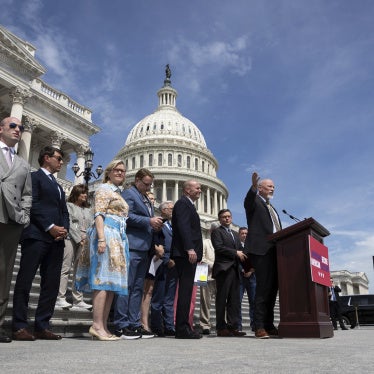President Bush is meeting today with the only world leader who honestly can say he has won the war on terrorism. Uzbekistan's President Islam Karimov, now making his first visit to the White House, is a lucky man. Before September 11, his regime was threatened by a violent al-Qaeda-affiliated group known as the Islamic Movement of Uzbekistan, or IMU, which raided Uzbek territory from Afghanistan under the protection of the Taliban. So Mr. Karimov offered U.S. forces a base to strike at Afghanistan and, more reluctantly, a bridge to bring in relief. Now, thanks to America, IMU fighters in Afghanistan have suffered huge losses.
The IMU's leader, and Mr. Karimov's greatest enemy, was reportedly killed by U.S. bombing. Uzbekistan's ethnic allies in the Northern Alliance have gone from near defeat to a share of power in Kabul. Meanwhile, Uzbekistan's U.S. aid budget has tripled. It has new stature as America's closest ally in Central Asia. While America's war goes on, Uzbekistan's is virtually over. What makes Uzbekistan's triumph awkward for the United States is that it seems to undercut Mr. Bush's pledge that the war will advance freedom. Uzbekistan is a relic of the Soviet past — a place where government opponents are purged, jailed or exiled, where authorities hold Stalin-style public denunciations of "enemies of the state," where dissidents are forced into psychiatric institutions, and where Muslims are jailed and tortured for practicing their faith outside state controls.
Mr. Karimov himself came to power in a flawed election amid the chaos of the Soviet empire's collapse. Before his last "re-election," even his handpicked opponent announced he was voting for the incumbent president. When the Organization for Security and Cooperation in Europe (OSCE) criticized Uzbek elections, Mr. Karimov offered a charming reply: "The OSCE focuses only on establishment of democracy, the protection of human rights and the freedom of the press. I am now questioning these values."
You might think there is a dilemma here: On the one hand, Uzbekistan is ruled by ruthless people; on the other, the country is vital to America's war effort. Indeed, Uzbekistan helped the United States defeat a state-sponsor of terrorism in Afghanistan. But it is itself a state-spawner of terrorism — a country that denies its people all peaceful avenues for dissent, thus driving opposition underground, into the shadows, right into the hands of radical Islamic groups. Uzbekistan's help in the war must be weighed against the harm these policies do.
To its credit, the Bush administration seems to agree. Elizabeth Jones, the assistant secretary of state responsible for Central Asia, argues: "If the people of this country feel they have no choices, feel they have no voice in determining their parliament, their president . . . [they] are going to find a much more congenial home in extremist organizations." In recent weeks, the administration has pressed Uzbekistan hard to release political prisoners and to open up some space for peaceful political organizations. Just before the summit, it convinced Mr. Karimov to let one of Uzbekistan's banned human rights groups function openly and legally for the first time.
Still, with U.S. aid flowing unconditionally, Mr. Karimov probably believes he can avoid more fundamental change. The administration has not tied the millions it is pouring into Uzbekistan to specific demands because it hopes aid will do good, strengthening education, health care and civil society. But the aid, much of which in fact goes to the Uzbek military, could just as easily help Mr. Karimov delay tough political and economic reforms. It could associate America with another abusive regime in the Muslim world.
The key is to link U.S. engagement directly to U.S. concerns about human rights. For example, Mr. Karimov has asked the United States to make its military bases in Uzbekistan permanent. The Pentagon has expressed little interest. But the administration should not give up its leverage by rejecting Mr. Karimov's offer outright. It should tell him bluntly that the nature of its security partnership will depend on his progress in ending human rights abuses and openness to political change.
Above all, the administration should not allow Mr. Karimov to keep playing on America's gratitude for his role in the war. Uzbekistan's president helped America in his own self-interest and benefited from the war more than any other U.S. ally. Meanwhile, his repression continues to threaten America's interests by alienating peaceful Muslim believers in a region where terrorist groups may still be looking for recruits.
Mr. Bush should make clear today that Uzbekistan owes America more than a base and a bridge. If Mr. Karimov is serious about helping defeat terrorism, he owes his people, America, and the world a more open society.







